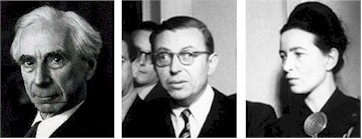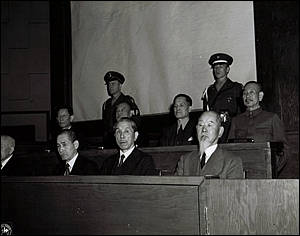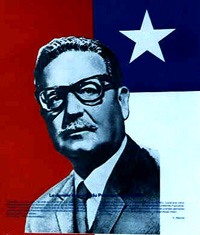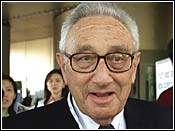![]()
Regarding Henry
![]()
Stephen Berry
A Book Review by Stephen Berry: The Trial of Henry Kissinger Christopher Hitchens: Verso, 2001, 159 pages.
In the mid-1960s Bertrand Russell and friends decided to set up a War Crimes Tribunal on the Vietnam War. It soon became obvious that it would investigate only alleged American and South Vietnamese war crimes. Many political sympathisers were dismayed that the Vietcong and North Vietnamese were to be excluded from the indictment. Russell's original idea of a tribunal of disinterested judges was also thrown overboard. Amongst those on the tribunal were Jean-Paul Sartre, Isaac Deutscher and Simone de Beauvoir, all 24-carat leftists whose anti-American credentials were impeccable. A statement was issued demanding the trial of war criminals Johnson, Rusk, McNamara and Lodge. The one-sided and biased nature of Russell's tribunal managed to unite in condemnation the New York Times and New Leader in the U.S. and Peace News and the Daily Mail in the U.K.

Bertrand Russell, Jean-Paul Sartre and Simone de
Beauvoir were judge and jury in the Vietnam War
Crimes tribunal
What the newspapers could see with perfect clarity when confronted by the Russell Tribunal is unaccountably lost when the war crimes trials at Nuremberg, Tokyo and The Hague are examined. People overlook that Russell and his supporters had taken over the Nuremberg model in its entirety. As with Nuremberg, the judges would be openly biased against the defendants. As with Nuremberg, only one side of the story would be looked at.
The Nuremberg Indictment set the standard. 'Crimes Against Peace' had clearly occurred. Yes, we would look at the German invasion of Poland. No, we would not look at the Soviet march into Eastern Poland which had occurred simultaneously with the German attack. 'War Crimes' there had been a plenty. Yes, unrestricted submarine warfare by the German Navy would be scrupulously examined. No, the obliteration of German cities by the Allied air forces was not relevant. 'Crimes against Humanity' would be treated in the same way. The mass killing of subject races by the Germans would come under the microscope, but not the Katyn massacre or the dropping of the Atomic Bomb on Japan.
But you would be wrong if you thought that the obvious double-standards of the original trials had dulled the appetite of people for these one-sided charades. Milosevic has recently found himself in the dock at The Hague. We will be looking in detail at alleged Serbian atrocities, but the activities of the drug-peddling KLA will scarcely figure. Ethnic cleansing by the Serbs will be under the spotlight. But the biggest single example of ethnic cleansing in the recent Balkan wars, the expulsion of hundreds of thousands of Serbs from the Krajina region by the Croats backed by their Western Allies will barely merit a mention.
If everyone is having fun accusing their enemies of war
crimes, it would be churlish to deny the odd journalist his
day. Christopher Hitchens wants to put Henry Kissinger on
trial for war crimes. It was always bemusing for an outsider
to see the extent to which journalists in the U.S. wanted to
hang Richard Milhouse Nixon out to dry for doing the sort
of things that other U.S. presidents commonly did.
Unfortunately, 'Tricky Dicky' spoilt their party by dying and
Henry Kissinger had to be appointed to take over the Nixon
mantle. It has to be said that the case brought by Hitchens
against Kissinger is rather weak.
There exists, within the political class of Washington, DC, an open secret that is too momentous and too awful to tell
"There exists, within the political class of Washington, DC, an open secret that is too momentous and too awful to tell" (6) But Hitchens is made of tough stuff and bravely lets the cat out of the bag. During the 1968 presidential campaign, Kissinger, at that time a Democrat, was working for Lyndon Johnson, assisting with the peace talks taking place with the North Vietnamese. Hitchens claims that Kissinger told Nixon that Johnson was contemplating a bombing halt to help the campaign of Hubert Humphrey, Nixon's opponent. Nixon's supporters in turn told the South Vietnamese government that a Nixon government would offer a better deal than any that could be offered by the Democrats. The South Vietnamese promptly withdrew from the Paris talks, damaging the 'peace plank' on which the Democrats were contesting the election. Four years later Nixon struck a deal substantially the same as that which was on offer in 1968, but in those intervening years 20,000 Americans and a large number of Vietnamese, Cambodians and Laotians lost their lives.
Even if we accept this story, there are a number of problems to be faced before we can bring in the guilty verdict on Henry. The fact that the deal struck in 1972 was similar to that on offer in 1968 does not logically show that a better one (viewed from 1968) could not have been struck in 1972. There is no doubt that the American government would have liked to do just that. Kissinger himself has pointed out that of the 20,000 American troops killed in the Nixon period, 12,000 occurred in the first year before the change of policy could take effect - "clear legacies of the previous administration". When Nixon entered office, American troop numbers in Vietnam stood at 525, 000. By 1972 they had been reduced to 25,000.
There is something slightly naïve and touching when Hitchens displays shock at the Nixon campaign people "colluding with a foreign power" (12). Goodness gracious, has Hitchens read no history books? The House of Stuart sought the help of an enemy power, France, in its attempts to recover the British crown. In the Russian civil war, the Whites eagerly sought the help of Western Powers in their fight against the Reds. If I were to number all the opposition groups in Third World countries which have solicited the help of the U.S. since 1945 to overthrow the existing government, I could draw up a list the length of my arm. Why should American politicians thirsting for state power be denied what has been allowed to their confrères the world over? At least when Nixon's entourage colluded with the South Vietnamese, it was with a friendly power. None of this makes for very edifying reading, but is it the stuff of which war crimes are made?
Hitchens quotes approvingly General Telford Taylor, a chief prosecutor at Nuremberg, when Taylor states that if the standards of Nuremberg and Tokyo had been applied to the American statesmen and bureaucrats involved with Vietnam policy, "there would be a very strong possibility that they would come to the same end he (General Yamashita) did" (25). Later in the rush to establish the culpability of Kissinger, Hitchens mentions the trial of Koki Hirota, the Japanese Foreign Minister between 1933 and 1938. When Hirota heard of the 'Rape of Nanking' by Japanese forces, he demanded and received assurances from the War Ministry that any atrocities would be stopped. The Tokyo tribunal however, found Hirota guilty because he was "derelict in his duty in not insisting before the Cabinet that immediate action be taken to put an end to the atrocities." (29) Hirota was held responsible and duly sentenced to death. What holds for Hirota should hold for Kissinger maintains Hitchens.

Hirota, (front row, third from left) at the Tokyo War
Crimes Trial. Methinks, he did not protest enough
But fair-minded people might question the judgement against Hirota at Tokyo. Hirota, like Kissinger, had no control over troops in the battle zone. Hirota showed that he disapproved of misbehaviour by troops in the field and we don't know that Kissinger thought any differently from Hirota on this subject. People are fond of group guilt because it makes convictions easier. But is it right? Imagine that a person is the head of a firm and makes it clear that he thinks the law should be obeyed. Imagine further that some of his workers commit a robbery whilst working for the firm. Would it be fair to hold him responsible for their behaviour? I hold that the workers and any immediate supervisors should be held responsible. Similarly, I hold that the troops in Nanking and their officers should be held responsible for any misbehaviour which took place there.
And it really would be strange if a representative of the administration which did most to end the war in Indochina should be put on trial for the horrors which went on there. I would be more inclined to lay the blame on the two previous administrations of Kennedy and Johnson who both expanded the American presence in Vietnam One might add that the Kennedy White House mounted a successful coup against the South Vietnamese government in which the president, Ngo Dinh Diem, was killed. One might point out that Lyndon Johnson used a trumped-up naval incident to fool the American Congress into passing the Gulf of Tonkin Resolution thereby widening the war. In the hunting of Henry, Hitchens seems to be missing the real culprits.

Salvador Allende -- did he fall foul of Kissinger?
Hitchens may be on firmer ground when considers the American government's behaviour towards Chile after 1970. It's true that Hitchens seems to subscribe to many of the fairy stories which surround the Allende government. For instance, he stresses the measures to destabilise the Chilean government by the U.S.(66) but fails to mention the greatest destabilising influence - that of Salvador Allende himself Perhaps it was the examples of Fidel Castro and Che Guevara which tragically inspired Allende with the notion that with 36 per cent of the vote he would be able to remake Chile from top to bottom.
But Hitchens's specific charge against Kissinger is that as head of the so-called '40 committee', he was involved in covert action to assassinate the head of the Chilean army, General René Schneider, who was maintaining the traditional refusal of the Chilean military to intervene in the political process. Hitchens claims that machine guns were sent from Washington to coup plotters in a diplomatic pouch. Schneider was eventually kidnapped and murdered, though not with the guns from the U.S. This is a matter which plainly needs further investigation.
Hitchens also criticises Kissinger for lack of intervention on a number of occasions:
- Kissinger failed to warn off the Greek government which was implicated in a coup in Cyprus in 1974.
- Kissinger did nothing to prevent the West Pakistan government's violence in its eastern province. (which later broke away to become Bangladesh)
- Kissinger did not try to prevent the Indonesian government from invading East Timor in 1975.
I could mention the cold war realpolitik that governed Kissinger's actions here. For instance, Pakistan was his link to China and was important for the subsequent rapprochement - the major foreign policy initiative of Nixon's first administration. But there is no need to analyse in detail what many people consider to be the rather distasteful subject of great power diplomacy. Remember that Kissinger is indicted with war crimes here. He is not charged with failing to be a boy scout at every possible opportunity. To fail to carry out a good deed may be reprehensible, but it most definitely is not a crime. People ought also to do well to remember that intervention in the affairs of other countries has the habit of producing the opposite results from those desired. Jimmy Carter followed the Hitchens recipe in Iran. But the pressure on the Shah to improve human rights may have weakened his government and paved the way for a theocratic regime and subsequent misery for the Iranian people. If Carter's policy played a part in success of the Mullahs and subsequent human rights abuses far worse than the Shah would have contemplated, would it make sense to threaten Carter with a war crimes tribunal?

Kissinger, a keen student of Metternich and Bismarck
Hitchens also suggests that Kissinger was involved in the attempted assassination of a Greek journalist by the name of Elais Demetracopoulos, a Washington-based critic of the military junta which ruled Greece in the late 1960s and early 1970s. Hitchens produces a prepared statement saying the journalist had died in prison in Greece, intimating that this is precisely what would have happened to him had he been foolish enough to return there. It's pretty thin stuff and the link with Kissinger highly tenuous indeed. I might also mention that Demetracopoulos did not return to Greece and did not die in a Greek prison.
Would Henry Kissinger be convicted of war crimes on the basis of this book? The history of war crimes trials shows us that if his enemies were judge and jury - and in war crimes trials this usually is the case - the answer would be a resounding yes. But I will be a little more discriminating. Kissinger in government behaved as you would have expected a student of Metternich and Bismarck to behave. He had little taste for Wilsonian idealism but even less for the use of brute force favoured by the political gangsters of this world. Rather cleverer than most perhaps, he pursued those policies which he judged would maintain America as a world power. It's hard to see that someone else in his position would have behaved radically differently. If you think he was a war criminal, you are making a pretty damming statement about the present world order.
![]()


Top 50 books of all time : by Old Hickory:-
"I have limited the selection to the books I have read. I keep to the norm of not recommending to others books I have yet to read. Clearly, books I have not read by now suggests a judgement of some sort."
Further reading:
PDF version
of this page
![]()
henry.pdf
Download
Requires Adobe
Acrobat Reader. This is
available
for free at
www.adobe.com
and on many free
CDs.
![]()
What the newspapers
could see with perfect
clarity when confronted
by the Russell Tribunal
is unaccountably lost
when the war crimes
trials at Nuremberg,
Tokyo and The Hague
are examined. People
overlook that Russell
and his supporters had
taken over the
Nuremberg model in its
entirety. As with
Nuremberg, the judges
would be openly biased
against the defendants.
As with Nuremberg, only
one side of the story
would be looked at.
![]()
![]()
There is something
slightly naïve and
touching when Hitchens
displays shock at the
Nixon campaign people
"colluding with a
foreign power" (12).
Goodness gracious, has
Hitchens read no history
books? The House of
Stuart sought the help of
an enemy power,
France, in its attempts to
recover the British
crown. In the Russian
civil war, the Whites
eagerly sought the help
of Western Powers in
their fight against the
Reds. If I were to number
all the opposition
groups in Third World
countries which have
solicited the help of the
U.S. since 1945 to
overthrow the existing
government, I could
draw up a list the length
of my arm. Why should
American politicians
thirsting for state power
be denied what has been
allowed to their
confrères the world
over?
![]()
![]()
But fair-minded people
might question the
judgement against
Hirota at Tokyo. Hirota,
like Kissinger, had no
control over troops in
the battle zone. Hirota
showed that he
disapproved of
misbehaviour by troops
in the field and we don't
know that Kissinger
thought any differently
from Hirota on this
subject. People are fond
of group guilt because it
makes convictions
easier. But is it right?
![]()
![]()
And it really would be
strange if a
representative of the
administration which
did most to end the war
in Indochina should be
put on trial for the
horrors which went on
there. I would be more
inclined to lay the blame
on the two previous
administrations of
Kennedy and Johnson
who both expanded the
American presence in
Vietnam One might add
that the Kennedy White
House mounted a
successful coup against
the South Vietnamese
government in which the
president, Ngo Dinh
Diem, was killed. One
might point out that
Lyndon Johnson used a
trumped-up naval
incident to fool the
American Congress into
passing the Gulf of
Tonkin Resolution
thereby widening the
war. In the hunting of
Henry, Hitchens seems to
be missing the real
culprits.
![]()
![]()
Remember that
Kissinger is indicted
with war crimes here. He
is not charged with
failing to be a boy scout
at every possible
opportunity. To fail to
carry out a good deed
may be reprehensible,
but it most definitely is
not a crime.
![]()
![]()
Would Henry Kissinger
be convicted of war
crimes on the basis of
this book? The history of
war crimes trials shows
us that if his enemies
were judge and jury -
and in war crimes trials
this usually is the case -
the answer would be a
resounding yes. But I
will be a little more
discriminating.
![]()
